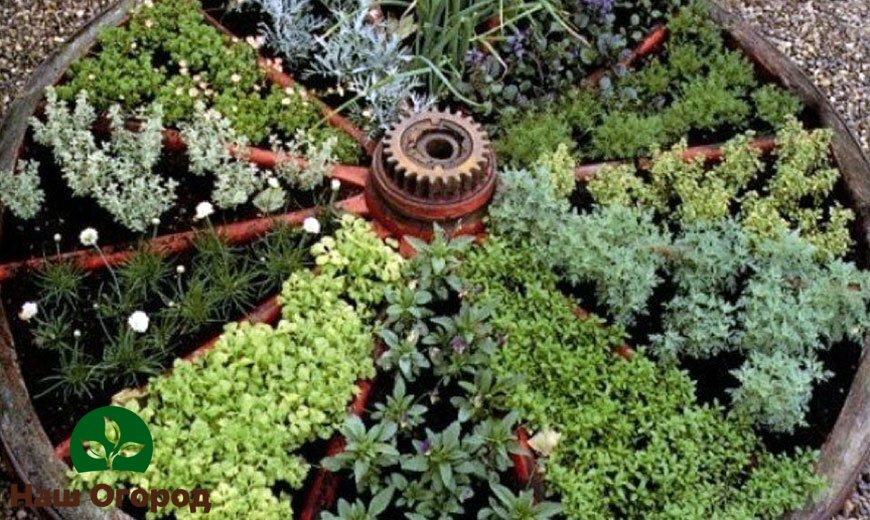Spicy herbs in the garden. How to grow a vitamin-rich crop
Content:
Spicy herbs: site preparation
Even if you go to the dacha exclusively to rest and relax and are an opponent of garden work, we are sure that you will not refuse spicy herbs! After all, it is not at all necessary to break a garden because of them, you can organize a beautiful flower bed - spicy plants are decorative and such a flower bed will undoubtedly decorate your garden. You can plant them in the near-trunk circles of fruit trees, in this case, the herbs will benefit not only you, but also the trees - the phytoncides they release disinfect the earth and scare away pests. Or plant herbs in beautiful pots and move them around the garden, depending on the weather conditions or your mood. In this case, you can even take a mobile flower bed home for the winter and enjoy the aroma, taste and beneficial properties of herbs all winter.

If you settled on an option with a garden bed or flower bed, choose a sunny place. Some of the crops will be perennial, so you need to think over the planting scheme well so as not to disturb them for the next year. Place tall plants a little further, undersized plants closer to the edge of the flower bed. Perennial spices will grow over time, so it is not recommended to initially plant them too close to each other.
So, you have chosen a place, we proceed to the preparatory work. Spicy herbs do not require special care, but they do not tolerate soil locking at all, so it is very important to organize drainage. To do this, remove the soil layer and fill in expanded clay, crushed stone or brick fragments - this will help the water not to stagnate. The soil can be any, only a high nitrogen content affects the spices unfavorably - they begin to grow strongly, the aroma and immunity weaken. With watering, everything is also easy - it is necessary after planting, and then only if necessary, during a drought. But be sure to regularly loosen the soil and remove weeds.
Plant selection
When choosing perennial plants for a spicy flower bed, it is definitely worth stopping at thyme (when buying a plant or seeds, be careful - there are also inedible species). The plant takes root easily and grows quickly, it is an excellent addition to tea and an excellent seasoning for meat. An excellent neighbor for thyme will be salvia officinalis - a very beautiful shrub with velvety leaves of an unusual gray color. This plant is a doctor, able to help in the treatment of many ailments, it has antiseptic, anti-inflammatory and expectorant properties. Be sure to plant mint, it is also unpretentious, grows well, and its taste and useful properties cannot be overestimated! All summer you can add green leaves to salads and desserts, as well as prepare various refreshing drinks. And in winter, you can enjoy tea with mint and add it as a seasoning to meat.
Favorite spices are lavender and rosemary. Lavender is largely due to its decorative effect, although it also has many medicinal properties - it helps with colds, acts as a sedative, and is widely used in cosmetology. Lavender is used as a seasoning for salads, sauces, soups, and is found in some herbal teas.

Rosemary can also be used green or dried and is one of the most popular spices.Rosemary added to meat or game will bring you success and fame as the best culinary specialist. If you are in a bad mood, have a bad day and have no strength - rub a few leaves in your fingers and smell (you can replace it with rosemary oil) - the smell of rosemary increases tone and has a beneficial effect on the nervous system. The only problem is that both lavender and rosemary are thermophilic plants and do not tolerate wintering very well in the middle lane. Therefore, for the winter, it is recommended to cover them with spruce branches, or initially plant them not in the ground, but in pots, then during the cold weather you can bring them indoors.
Plant basil from annual herbs. The most popular varieties are “Yerevan” (bluish foliage, smells of tea and allspice), “Baku” (with dark purple leaves and mint-clove aroma) and “Spoon-like” (light green, smells of laurel). Basil is added to almost any dish (salads, soups, sandwiches, meat), it can even serve as a basis for tea. Basil infusion helps with kidney and intestinal diseases.
And of course, what a spicy flower bed without the well-known dill, parsley and cilantro! All of them are not demanding and grow easily in any conditions, and if you plant curly parsley instead of ordinary parsley, then it will decorate with its appearance not only a flower bed, but also any dish.
Procurement of raw materials
Spices are harvested for the winter throughout the summer, always in dry weather. It is better to do this in the afternoon or in the late afternoon, the main thing is that there is no dew on the leaves. Collect only healthy, intact leaves and do not chase the amount - herbs retain their properties for a year, so it is better to make new stocks next summer. Tie the collected herbs in small bunches and hang in a dry, well-ventilated place for two to three weeks. The finished raw material becomes brittle, crumbles from touch, it is crushed and stored in glassware or paper bags. You can make fragrant sachets with herbs in linen bags (if you decorate the bags with embroidery, then such sachets will be an excellent gift for friends and family). Sachet with lavender can be placed in the closet - its smell repels moths. And carry sachets with rosemary, mint, sage and thyme with you - they strengthen the immune system.

